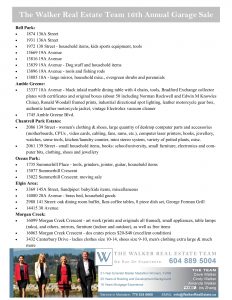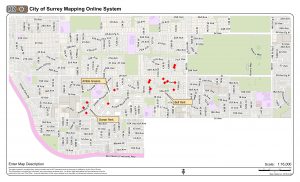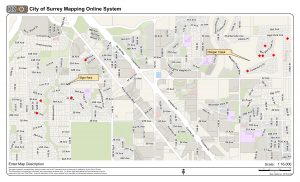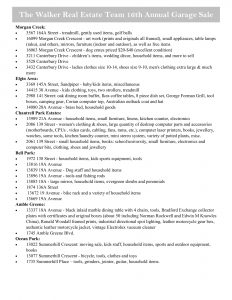
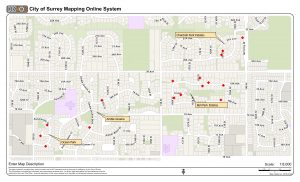
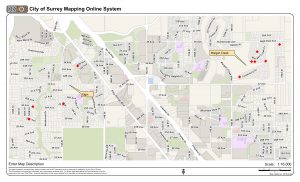
Month: April 2018
16th ANNUAL NEIGHBOURHOOD GARAGE SALE Saturday, April 28th at 9 am – Final List
Posted by: Kimberly Walker
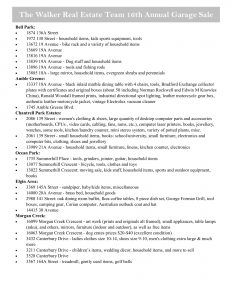
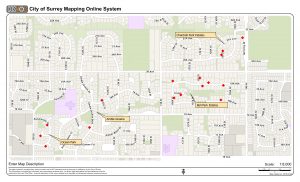
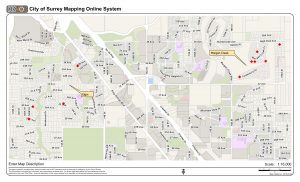
The Flexible Down Payment Program
Posted by: Kimberly Walker
One of the toughest challenges for homebuyers is being able to save money at the rate of property price increases.
We know many high-income renters would like to be homeowners, but they’re just unaware of how to make the transition and are unable to save fast enough.
There are several options which are great for a down payment if you can use a combination or one of the traditional methods
1. Savings
2. Gift from parents
3. RRSPs
4. Selling an asset
5. Inheritance
Kindly keep in mind this option won’t be for everyone as the following criteria must be met; it’s simply to illustrate the opportunity to go from renter to owner as soon as possible.
The Flexible Down Payment program allows homebuyers to use existing credit facilities as their down payment.
DETAILS:
Minimum household income required is $200,000 combined
• Minimum 650+ beacon score
• Minimum two years history reporting on Credit Bureau
• Sources of down payment: line of credit, credit card, personal Loan
• Include borrowed down payment in the debt servicing of the deal. Example: Unsecured LOC at 3%, Credit Card at 3%, store brand Credit Card at 5%, Personal Loan at actual payments.
• No late payments in the past 36 months
• High Ratio Deals only: 90.01-95% LTV
• 25 year amortization
• Strong Employment History
• No previous bankruptcy or consumer proposal
We can walk you through the details, contact a Dominion Lending Centres mortgage professional today!
The Mortgage Insurance Market & Wholesale Lenders
Posted by: Kimberly Walker
The Canadian mortgage market used to be very simple. We had the big banks, credit unions, and trust companies.
However, almost 20 years ago, the Canadian government made three major changes to the Canadian mortgage industry. First, the government and CMHC put their weight behind Canadian mortgages by guaranteeing an insurance payout to lenders in the event that a borrower does not pay. Yes, the Canadian taxpayers are on the hook if CMHC goes under.
Second, Canada also began to allow lenders to pay for mortgage insurance for their borrowers, even though the insurance was not required. Borrowers would not know that their mortgage is insured, rather the lender would pay for, and insure the mortgage on the “back end” in order to make the mortgage less risky. I.E: if the borrower did not pay, the insurer would pay the lender (just as they would pay if the borrower had less than 20% down payment and was charged for insurance themselves).
And third, Canada allowed its lenders to bundle up their mortgages and sell them to investors. The securitization of mortgages (the process of taking the mortgages and transforming them into a sellable asset) allowed investors to purchase many mortgages at once, knowing there would be a specific return. The return here would be just less than the interest rate on the various mortgages (less because the lender has to make a little bit of money for creating the mortgage bundle or security).
Now, mortgage investors are looking at two things: investment return and mortgage risk. The lower the risk of an investment, the lower the return an investor may be willing to see. Because Canadian lenders can insure their mortgages against default (non-payment), investors are very keen on purchasing these mortgages. Thus, investors provide lenders with a lot of inexpensive money to lend out, which in turn, provided for better interest rates for borrowers.
As an aside, an example of investors may be one of Canada’s large banks, an American bank, pension funds, and/or other financial institutions.
The result was the emergence and major growth of mortgage finance companies, called wholesale lenders or monoline lenders.
Monoline lenders, encouraged by access to cheap capital, set up efficient mortgage underwriting (approval) operations and were able to provide flexible mortgage products and better-than-the-banks interest rates for their clients.
The overwhelming majority of wholesale lender mortgages are back-end insured by the lender, packaged up, and sold to investors.
What is interesting here is that wholesale lenders will insure mortgages transferred from one institution to another – something that banks do not do. This allows for better interest rates when renewing with a wholesale lender than if renewing with your current bank lender.
If you have any questions related to mortgages, contact your Dominion Lending Centres mortgage professional today.
Setting Up Your HELOC
Posted by: Kimberly Walker
A HELOC, or, Home Equity Line of Credit, can be one of the greatest gifts you give yourself. Borrowing money against your home as you accumulate equity through a shrinking mortgage or an increasing property value- something almost many people in the Vancouver and Toronto markets can relate to.
With all this increasing value and home appreciation, people are looking to cash in and utilize this new-found money. Unfortunately, one of the first things people think to do is sell! This can be counter-intuitive because you may of just sold your house for $150,000 more than what you bought it for last year, but you are now stuck buying a house that has gone up $100,000, $150,000, possibly $200,000 in the same amount of time.
So what can you do?
Open up a HELOC. You can do this separately through a second lender, move your mortgage over to one of the big banks like Scotia and enter a STEP, or utilize Manulife’s new Manulife One mortgage product. As you pay down your mortgage and accumulate equity in your home, you unlock the ability to spend money on a line of credit that is secured against that same equity you have built up in your home.
Let’s say you bought a pre-sale condo for $225,000. Two-years later it is worth $375,000. If you have that mortgage set-up with a HELOC component, you could potentially have $100,000 available to you on a line of credit if you qualify. What could you do with $100,000 where you are making interest only payments? Buy a rental property that breaks even or better yet has positive cash flow. You can build equity in a second home while someone else pays the mortgage through rent.
Don’t want to buy an investment property? Maybe you want to invest in stocks or funds where the expected return is more than the interest you are paying? Maybe you need to do renovations? Planning a wedding? Travelling? The list goes on.
Setting up a HELOC for yourself can open up many doors, all without having to give up your property and pigeon hole yourself into over-paying for someone else’s! Call a Dominion Lending Centres Mortgage Professional today to see if you qualify for a Home Equity Line of Credit.
Unique Homes Have Special Problems
Posted by: Kimberly Walker
Recently one of the former members of the boy band New Kids on the Block expressed an interest in buying this lighthouse off the coast of Virginia in the U.S. Unique homes can be a lot of fun to own and to live in. However, there are some things you should be aware of before you make an offer on a unique property. He probably paid cash for this property because unique properties can be difficult to find financing for.
While we don’t have lighthouses in Western Canada, another type of property does come onto the market from time to time; church conversions.
I had a client last year who owned a church conversion in a small town in Saskatchewan. The building was great. It had lots of room, and it was on a large lot.
The problem was trying to find a lender who would lend on a church conversion. I found out that the big banks would lend but only in larger cities and towns. They would lend on homes in small towns in Saskatchewan and Alberta but not both. The only solution was to go to a local credit union that knew the property and the town.
Why won’t big banks do unique homes like this in smaller centres? Marketability – if the borrower doesn’t keep up their payments it would take months to find a buyer who wanted something like this and it would cost the bank a lot to keep the property until a buyer could be found.
Another lesson to be learned – before you make an offer on a unique property always check with your Dominion Lending Centres mortgage professoinal to see if you can get financing on your special home.
Housing affordability improves for first time in 2 years
Posted by: Kimberly Walker
There was an improvement in Canada’s housing affordability measure at the end of 2017.
It was the first time in two years that RBC Economics Research’s Housing Trends and Affordability Report has shown a decrease in its aggregate measure, albeit just 0.2 percentage points nationally to 48.3%.
As the measure is shown as the share of household income that would be required to carry the costs of owning a home at market price, a decrease indicates improving affordability.
Toronto saw a larger decrease in the measure, down 2.3 percentage points to 75.1%, but it is unlikely to have a meaningful effect.
“We expect the relief to Toronto ownership costs that ensued from the introduction of Ontario’s Fair Housing Plan to be short-lived,” said Craig Wright, Senior Vice-President and Chief Economist at RBC. “Our view is that Toronto prices will bottom out sometime this spring. Then we expect further interest rate hikes through the remainder of this year, which has the potential to stress housing affordability markedly in Canada.”
The report shows that affordability worsened in BC with Vancouver and Victoria both seeing higher prices in the last quarter of 2017, with the aggregate affordability measure rising 1.8 and 0.5 percentage points respectively.
“Unfortunately, Vancouver homebuyers are being challenged by the worst affordability levels ever recorded in Canada,” said Wright. “The costs of owning a home at today’s prices would have represented an astounding 85.2% of a typical household’s income in the fourth quarter. In this context, it wasn’t a surprise to see the BC government announced further housing policy initiatives to cool the market in its 2018 budget.”
Affordability also weakened in Montreal for the ninth time in the past ten quarters, denting its reputation as an affordable market.
The picture has changed little for housing markets in the Prairies and Atlantic Canada. Home ownership costs have remained largely stable though, a small increase in mortgage rates contributed to a slight deterioration in affordability within these regions in the fourth quarter.
Which Realtor Should You Use?
Posted by: Kimberly Walker
Finding the best realtor for you involves doing some leg work. It can be overwhelming, kind of like choosing which ice cream you want to try! You go to the ice cream store and they have over 50 flavours and after you have contemplated, you opt for vanilla, just because it was easy.
Finding the best realtor for you is not “vanilla.”
Here are five questions you should always ask your potential real estate agent:
1. How does your experience benefit my real estate transaction? Where the agent just completed a course on negotiation skills or sold a home in your neighbourhood, they should be able to bring a unique edge to the table.
2. If you were buying or selling your home, what would you look for in an agent?
This question is a great way of getting the inside scoop on the industry. What do industry professionals see as an essential asset? How does each agent vary in those priorities?
3. Tell me about a recent work success. Give the agent a chance to discuss their latest win, and you’ll learn what they’re passionate about and how they’ll turn your home search or sell into their newest achievement.
4. What are your most effective approaches to marketing a home? Rather than the standard ‘how will you market my home,’ ask which methods are delivering results. If your agent is particularly successful with new school social media or tired and true networking, you’ll have expectations on how they’ll tackle selling your home.
5. Give the rundown of the conditions, commission fees and agreements. These basics will play a major role in how you choose your real estate agent. Ask for the specifics at each interview, and you can see how each partnership measure up.
And if you have any questions, contact your local Dominion Lending Centres mortgage professional.
